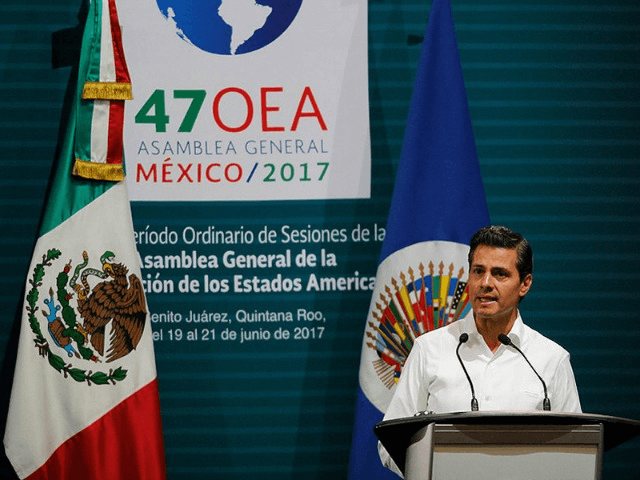Mexico, Chile, and Peru are among 11 Latin American nations, plus Canada, that announced they will not recognize the new “Constituent Assembly” created by socialist dictator Nicolás Maduro in Venezuela.
The group of foreign ministers assembled in Peru said they would only recognize legal agreements approved by the real Venezuelan parliament, the National Assembly, in accordance with the Venezuelan constitution.
The Foreign Minister of Chile, Heraldo Muñóz, said he and his colleagues wanted to send a “firm statement” that they “will not tolerate military coups,” but also wished to maintain an “opening for dialogue” with the Maduro government. He also expressed a desire to work with the Venezuelan government to deliver humanitarian aid to its starving population.
Peruvian Foreign Minister Ricardo Luna said the Venezuelan Constituent Assembly is “incompatible with international law, human rights and democracy in this region.”
“The fading out of democratic institutions in recent times has reached its culmination and what we have in Venezuela is a dictatorship,” Luna declared.
Mexican Foreign Minister Luis Videgaray said the declaration “validates our position in favor of democracy and democratically elected institutions in Venezuela.”
This week, Videgaray called Maduro a “coward” who “uses the power of the State to dismantle democracy and lash out against his people.” He was responding to a taunt from Maduro that Mexico’s president was acting like an “abused employee of Donald Trump” for not offering more vigorous resistance to the American president’s plan for a wall on the southern border of the United States.
Some observers speculate that Mexico has taken an especially strong stance against Maduro because it has its own left-wing populist leader to deal with, Andrés Manuel López Obrador. López Obrador is seen as a significant candidate for Mexico’s 2018 presidential race. The party currently in power has been ominously referring to him as “Mexico’s Maduro,” much as they compared him to Maduro’s mentor Hugo Chávez when he ran for president in 2005.
Other left-wing leaders in Latin American countries have sought to rally support by holding up Maduro as a hero and denouncing his critics as right-wing fascists. However, the more moderate left is worried that viral Maduroism is infecting parties in their countries and threatening to split militant factions away from decades-old political coalitions.
Argentina, Brazil, Colombia, Costa Rica, Guatemala, Honduras, Panama, and Paraguay joined Mexico, Chile, and Peru in signing the pronouncement refusing to recognize the Constituent Assembly and calling upon Maduro to shut it down. Canada also signed on.
The Maduro regime has accused several of these nations of working with the United States to topple the Venezuelan government. As for its domestic opponents, the regime has taken to describing them as “violent fascists” and “terrorists” who are waging war against the Venezuelan people.
Grenada, Guyana, Jamaica, Santa Lucia, and Uruguay sent ministers to the conference but did not sign the denunciation of the Constituent Assembly. Some of these reluctant nations have experienced severe schisms in their left-wing parties over Venezuela. For example, Uruguay’s President Tabaré Vázquez was attacked from the left for abandoning the “sister Bolivarian Republic of Venezuela” by suspending it from Mercosur, the Common Market of the South.

COMMENTS
Please let us know if you're having issues with commenting.